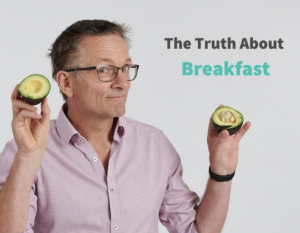Table of Contents
Is breakfast the most important meal of the day or is intermittent fasting the key to a healthier you? Doctor Michael Mosley reveals three health benefits, plus how to get started
A widespread misconception that originated as a marketing ploy from cereal brands, is that breakfast is the most important meal of the day.
But is it really?
There is plenty of research that suggests, that extending your fasting window (breaking your fast later in the day) has plenty of health benefits including improving metabolic health and increased weight loss.
Eating breakfast should depend on your schedule and preference: if you’re hungry, then eating a healthy, Mediterranean-style breakfast can be beneficial, and will help you keep your blood sugars steady.
On the other hand, skipping breakfast if you’re not hungry isn’t harmful and won’t necessarily result in weight gain or an increased appetite later in the day time.
Intermittent Fasting Benefits…
The long-term effects of intermittent fasting are yet to be proven by clinical studies however, Dr Mattson has found many benefits from short-term clinical studies.
The following benefits have been collated from Dr Mattson’s 2019 study in the New England Journal, ‘Effects of Intermittent Fasting on Health, Ageing, and Disease’.
Benefit #1 Weight-loss
Intermittent fasting is known to aid weight loss and with weight loss often comes a reversal of type 2 diabetes, improvement in sleep, better blood pressure and less exposure to chronic diseases.
But how does it work? Firstly, skipping breakfast will automatically reduce your daily calorie intake. And research shows that skipping breakfast doesn’t lead to an increased appetite later in the day.
Secondly, intermittent fasting works a special kind of magic on your metabolism.
I think of it as ‘flipping the metabolic switch’ – intermittent fasting has been recognised to speed up the process in which ketone bodies are produced. When analysing diets that reduced caloric intake on one or more days each week, Dr Mattson recognised elevated levels of ketone bodies were produced on those specific days.
research shows that skipping breakfast doesn’t lead to an increased appetite later in the day
You will also have a decrease in insulin. Insulin is what’s called an ‘anabolic’ hormone, that builds up fats, but (with fasting) you get the opposite. Insulin goes down and then all these wonderful hormones kick in that increase your metabolism and enhance weight loss.
You see an increase in human growth hormone (HGH) and also an increase in norepinephrine (nor adrenaline) which both increase the breakdown of fat for energy. So instead of an anabolic building, you have fat breaking down.
We know that when this happens, your body composition improves, in particular the visceral fat that is stored around and within your organs.
Last year, The Fast 800 online programme was independently validated by healthcare advisors who work in partnership with NHS organisations.
The key findings were:
- The independent analysis of the data from 23,745 members, showed significant weight loss and improvements in blood sugar levels.
- The Fast 800 Programme aligns with the NHS Diabetes Prevention Programme and the National Institute for Health and Care Excellence (NICE). It integrates the key methods used in rapid weight loss clinical trials providing a sustainable approach to weight loss and diabetes remission.
READ MORE: ‘Ditch FAD diets’ says Dr Michael Mosley – plus 7 healthy recipes for the New Year
Benefit #2 Improved cognitive function
When we fast, cells that no longer work properly are consumed by the body and discarded (autophagy). Experts think this process of ‘autophagy’ may have the potential to prevent Alzheimer’s.
In fact, one study found that short-term fasting reduced Alzheimer’s symptoms in nine out of ten people.
Although there is currently no cure for Alzheimer’s disease, it has been recognised that intermittent fasting could potentially delay the onset and progression of the disease. It is important to note that this is based on animal studies and although a positive result, more human testing is required.
Ketones are a type of chemical that your liver produces when it breaks down fats
Dr Mark Mattson identified a positive correlation between a calorie-restricted diet and verbal memory, improved global cognition and executive function. He also recognised that one particular 2019 study showed positive results of improved working memory in adults when placed on a calorie-restricted diet for two years.
Also, the ketones released when you fast will also help keep your brain healthy. Ketones are a type of chemical that your liver produces when it breaks down fats.
Benefit #3 Reduced signs of Ageing
Dr Mattson recognised that intermittent fasting may enhance resistance to oxidative stress within the body.
Oxidative stress is associated with an increased risk of chronic disease and aging. Not only this, ketone bodies regulate the expression and activity of many proteins and molecules that are known to influence health and aging.
READ MORE: 5 things this anti-ageing haircare expert wants everyone to know
Intermittent Fasting – where to start…
#1 Make a plan
There’s a fair amount of pre-planning that needs to go into it if you’re going to be successful. Rather just jump into it, do read about it first. Have a plan, work out what you’re going to do, inform your friends and family and then get going.
The good news is that people say that they are surprised how quickly they get into the pattern and they very quickly stop feeling hungry.
I strongly recommend that you begin by going to The Fast 800 website, not least because you need to know, before you start, whether it is right for you.
intermittent fasting is at the heart of The Fast 800
The Fast 800 started more than 10 years ago, when I discovered that I had type 2 diabetes and high blood pressure. I lost 10 kilos in 8 weeks using the 5:2 diet, a form of intermittent fasting.
All these years later, intermittent fasting is at the heart of The Fast 800 and tens of thousands of people have followed my example, lost weight and improved their health using the same revolutionary approach.
With our new app, we’ve made it even easier to access all the scientifically based meal plans, exercise, mindfulness and health content that have made so many weight loss journeys possible
Broadly speaking, the programme isn’t suitable for people who have a history of eating disorders, people who are currently on certain medications or who have recently had surgery, or perhaps who are planning on getting pregnant etc (all of the fairly obvious categories).
#2 Remove all temptation
I think it is also important to clear out your cupboards and get rid of the junk food because unfortunately, if your cupboards are still full of junk food, it’s very tempting when you’re feeling a little bit peckish in the middle of the night!
I know that if I have chocolate and biscuits in the house, I will eat them, despite everything that I know, so my advice is to remove temptation.
Beyond that, you need to kind of tell your friends and family of your intentions to ensure you’re getting proper support, because certainly in the early days, it can be quite tough.
READ MORE: Fasting for weight loss – the nutritionist’s guide
#3 Find a community of people on the same journey
We are intensely social animals, so it is not surprising that studies have shown that being a member of an online community increases the chance of success when it comes to weight loss and sticking to lifestyle changes.
As our programme, which includes a Community, is now available in app form, we expect that it will improve member’s accountability. Members certainly say they find having a community very helpful and we will be carefully tracking to see how new members respond to using the app.
An initial study, done by independent experts, found that average weight loss at a year was around 10kg, which is impressive. We hope to improve on that now with the Fast 800 app.
#4 Quality food first
It’s also important to focus on what food you choose to eat during your eating window. A lot of people fasting adopt the mindset of, ‘I can eat anything I want in my eating window’, which often means reaching for ultra-processed food and drink.
However, we’ve found that healthy, Mediterranean-style meals, loaded with protein and fibre, is the key to improving metabolic health and sustaining it long term.
healthy, Mediterranean-style meals, loaded with protein and fibre, is the key to improving metabolic health
The other thing, of course, is when you’re restricting your calories you must ensure the calories you’re eating are healthy ones. You want them to be packed full of protein and other nutrients, so you need to make sure you’re following healthy recipes that meet your nutritional needs.
The Fast 800 website takes the stress out of calorie counting by providing a range of tasty, easy to prepare healthy recipes. It can be a real balancing act to get your protein, fibre, carbohydrate and calorie intake just right so the programme really does make life much easier. It also generates a shopping list making your supermarket trips simple too.
READ MORE: A Mediterranean diet is proven to ease these 5 menopause symptoms
#5 Try calorie counting too for the first couple of weeks
There have been a number of studies where people have been randomised to either eating around 800 calories a day for 12 weeks (which is what we do on the Fast 800), followed by a return to healthy eating, or simply asked to follow healthy eating advice.
These include the Direct study, where 298 patients with type 2 diabetes were followed for 2 years, at the end of which time those who had been counting calories at the start were not only more than 5kg lighter, but on far less medication and with far less complications.
#6 Avoid snacking and drinking your calories
I try not to snack as this prompts your body to consistently have higher blood sugar levels throughout the day – this is something we’re trying to reset by giving our bodies breaks between meals.
If you do need to snack between meals a handful of nuts is always a good option or something like celery sticks with a tbsp of natural peanut butter.
One important thing to remember is that adding milk to your tea/coffee in the morning will technically break your fast. However, we have found that a splash (less than 30ml) is usually okay and won’t affect blood sugar levels.
The Fast 800 is a flexible weight loss programme for better health and offers three separate approaches, personalised to your goals. All of the approaches follow the principles of a moderately low-carb, Mediterranean-style diet.
You can join the Fast 800 programme at www.thefast800.com, then access it online or via The Fast 800 app. The programme is do-able in your own home and whilst on-the-go.
The programme costs £119 for 12 weeks.
HEALTHISTA’S ANSWER TO MENOPAUSE; MENOSTART: PRESS PLAY, NOT PAUSE.
The Healthista Menopause Pack is a fully comprehensive online video workshop, led by Dr Dawn Harper; affordable, accessible and covering all aspects of the menopause, for those who need it most.
With expert advice and information from seven credible menopause industry experts, we hope that this online resource will help women navigate common health and wellness changes and challenges they may experience before, after and during the menopause.
Like this article? Sign up to our newsletter to get more articles like this delivered straight to your inbox.











More Stories
Thoughts as of late: on evolving, growing & that tiny voice inside
County Health Officials Report 17% Increase in Tuberculosis Cases
10 Most Nutrient-Rich Foods To Include In Your Diet